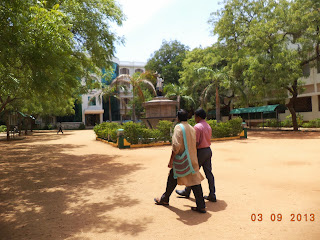Dr. Joseph Dorairaj, Professor of English,
Gandhigram University, conducted a workshop on Research Methodology today, (04
September 2013) for our MA, MPhil and PhD scholars. The workshop started with
the invocation by Dr. Ann Thomas, followed by Dr.Stephen’s welcome address.
Dr. K.Ganesh introduced the resource person of the day, Dr. Joseph Dorairaj. The
first session of the workshop touched upon the theoretical framework of
Research, and its various nuances, while the second session highlighted the
best practices in research.
Defining
Research as a “systematic activity that is directed toward discovery and the
development of an organized body of knowledge” (Best and Kahn), he also
outlined the three elements or components, namely: (1) a question, problem, or
hypothesis, (2) data, and (3) analysis and interpretation of data,”
respectively.
A good research,
then, is “expected to make a contribution to knowledge. It is expected to be ‘original’.
. . It does not have to be ‘original’ in the much more daunting sense that it
springs fully armed from the head of the
researcher without reference to any previous account”, but, “on the
contrary, in fact: it is much more likely to involve assembling ideas that have
not been brought together in quite that way before. And it does not have to
shift the paradigm: the contribution can be quite small, a piece of the jigsaw”.
Citing Belsey, he said, that, “research is expected to make a difference to the
standard account of a topic, whatever the topic might be”. Dr. Dorairaj
also outlined the three basic concepts in Research Methodology, like the Research
Tools, Research Methods and Research Methodology, and the three domains of
Research activity, which are broadly divided into: Physical and Life
Sciences: (experimental – laboratory-based), Social
Sciences: (empirical & numerical –
quantitative and qualitative), and, Literature: (textual analysis).
Professor then proceeded to detail on the various
types of research, namely, Pure/Basic/Fundamental and Applied Research, Experimental
(lab-based) research, Deductive and Inductive Research, Quantitative and
Qualitative Research, Diagnostic Research, Intervention Research, Action
Research, etc.
On choosing a topic for one’s research, Dr.Joseph
Dorairaj quipped that, most research starts with a hunch, or, an inspired
guess. Moreover, it should be interesting, and one should be passionate about
it. The work should not only be original, but also preferably non-canonical,
and that which contributes to the existing body of knowledge. Most of all, it
should have a usefulness or relevance to society. He also suggested around five
key texts like Research Methods for
English Studies, which would provide
a frame of reference for the research scholar.
The session ended on a happy note, with feedback by
Sebastian (MPhil), Ajil (II MA), Lemma (I MA) and the Vote of Thanks by Prof.Phebe
Angus.
Our sincere thanks to our Photographer Mr. Jagadeesh
Kumar (BA English, MCC), and to our Videographers Mr. Albert and Mr. Naseem of
the MA Communication Department, MCC.





